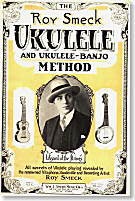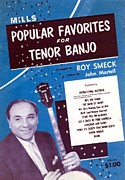Home · Listener's Guide · The Songs · Who's Who · Liner Notes · Selected Tracks · What's New · Search

Roy Smeck
- Born Ray Smeck, 6 February 1900, Reading, Pennsylvania
- Died 4 April 1994, New York City, New York
Roy Smeck was one of the truly great American popular musicians of the 20th century, one whose name would be as recognizable as Louis Armstrong's or Les Paul's if he hadn't specialized in a "minor" instrument, the ukulele. As a boy, Smeck was obsessed with learning to play musical instruments, and he almost suffered a nervous breakdown from his relentless practicing. He eventually narrowed his focus down to the guitar, banjo, and harmonica, and somewhere around the time of America's entry into World War One, he began performing on the vaudeville circuit. His was a novelty musical act. He would play one or more current popular tunes on the banjo while also playing a small harmonica.
 Over the next ten years, Smeck polished his act, incorporating a variety of dance steps and adding more amazing tricks. He added a jew's harp to the banjo and harmonica, and learned to flip the harmonica over with his tongue, even pretending to swallow it only to pop it back to his lips. As the popularity of Hawaiian music on the mainland grew, he added the ukulele, switching instruments in mid-tune. Then he began do such gymnastics as playing behind his back, spinning the instrument around, blowing across the sound hole, plucking the strings with his teeth and tongue, and bowing the strings like a violin. After studying fellow performer Bill "Bojangles" Robinson, he came up with a way to imitate the sound of Robinson's tap dancing on the ukulele. His amazing dexterity made him one of the more popular acts on the vaudeville circuit, and landed him a small spot in film history.
Over the next ten years, Smeck polished his act, incorporating a variety of dance steps and adding more amazing tricks. He added a jew's harp to the banjo and harmonica, and learned to flip the harmonica over with his tongue, even pretending to swallow it only to pop it back to his lips. As the popularity of Hawaiian music on the mainland grew, he added the ukulele, switching instruments in mid-tune. Then he began do such gymnastics as playing behind his back, spinning the instrument around, blowing across the sound hole, plucking the strings with his teeth and tongue, and bowing the strings like a violin. After studying fellow performer Bill "Bojangles" Robinson, he came up with a way to imitate the sound of Robinson's tap dancing on the ukulele. His amazing dexterity made him one of the more popular acts on the vaudeville circuit, and landed him a small spot in film history.
In 1926, as movie studios were experimenting with a variety of sound technologies, Warner Brothers shot a short that showed Smeck performing his act at the Manhattan Opera House, using the Vitaphone system. The Vitaphone synchronized a film projector with a record player. A 33RPM record provided the soundtrack for the silent film. Titled His Pastimes, the film and several other shorts, along with Don Juan, a feature starring John Barrymore, debuted on 6 August 1926 at the Warners Theatre in New York City. The film allows us to witness Smeck in his prime, and it still blows away people who thought that T. Bone Walker or Chuck Berry invented duckwalking and playing behind the back.
Smeck appeared in several other early sound films, including a feature with crooner Russ Colombo and a 1933 Paramount short that showed Smeck playing four instruments simultaneously. This short is also something of a milestone, since it uses split-screen editing and multiple soundtracks to show Smeck playing the steel guitar, tenor banjo, ukulele, and guitar. The mutli-tracking technique pre-dates Les Paul's own experiments by over ten years.
Testament to Smeck's celebrity at the time is the fact that he was invited to perform not only at the Inaugural celebration for President Roosevelt in 1932, but also to the gala concert held at the London Palladium in honor of King George VI's coronation in 1937.
Smeck made over 500 recordings, starting in 1921 for the Edison Company, and continuing on until his last album, for Kapp, in the mid-1960s. He often worked with Hawaiian and haole musicians, including Harry Owens and Ray McKinney, and he recorded several albums in the late 1950s with the Hawaiian singer Alfred Apaka. Most of his studio recordings in the 1950s and 1960s were on the Hawaiian acoustic guitar and steel guitar, although the ukulele remained his favorite instrument. As vaudeville died, he shifted to radio and even had his own show, heard in the New York City area, in the late 1930s. During World War Two and the Korean War, he appeared in USO shows, and played for GIs everywhere from Greenland and Iceland to Korea and Japan. He was a frequent guest on the many variety shows that ran in the first 10-15 years of network television, including Ed Sullivan's, Steve Allen's, and Jack Paar's.
 Smeck believed in educating as much as entertaining. He published numerous books of musical instruction, including a series with Mel Bay, and he stayed active as a teacher right up to the time of his death. Several generations of ukulele and banjo players credit him as an inspiration and mentor. When he was touring, he often put on workshops, appeared free at music stores, or held talent contests for local players. Over the course of his career, his name became better known among musicians than average listeners. When the Gibson Guitar Company released its Roy Smeck Hawaiian acoustic guitar, it was only the second artist model made, and at least three other companies named guitar or ukulele models after him. Smeck himself designed an unusual variant on the ukulele, called the Vita-Uke, that had a pear-shaped body and no sound hole.
Smeck believed in educating as much as entertaining. He published numerous books of musical instruction, including a series with Mel Bay, and he stayed active as a teacher right up to the time of his death. Several generations of ukulele and banjo players credit him as an inspiration and mentor. When he was touring, he often put on workshops, appeared free at music stores, or held talent contests for local players. Over the course of his career, his name became better known among musicians than average listeners. When the Gibson Guitar Company released its Roy Smeck Hawaiian acoustic guitar, it was only the second artist model made, and at least three other companies named guitar or ukulele models after him. Smeck himself designed an unusual variant on the ukulele, called the Vita-Uke, that had a pear-shaped body and no sound hole.
Although his performing and teaching schedule slowed down in his last two decades, he never retired. In 1983, two New York University film students, Alan Edelstein and Peter Friedman, made a documentary, Wizard of the Strings, about Smeck and his career, and the film won a mention for Merit at the 1984 Student Academy Awards.
Recordings
- Drifting and Dreaming, Coral
- Songs of the Range, Decca DL-5473
- Memories of You, Decca DL-8674
- South Seas Serenade, ABC-Paramount ABC-119
- Melodies with Memories, ABC-Paramount ABC-174
- Hi-Fi Paradise, ABC-Paramount ABCS-234
- The Magic Ukulele of Roy Smeck, ABC-Paramount ABCS-279
- The Happy Banjo, ABC-Paramount ABCS-309
- Alfred Apaka, Adventures in Paradise, ABC Paramount ABC-329
- The Haunting Hawaiian Guitar, ABC Paramount ABCS 330
- Alfred Apaka, Adventures in Paradise Vol. 2, ABC Paramount ABC 358
- Roy Smeck, His Singing Guitar and Paradise Serenaders, ABC Paramount ABCS 379
- Stringing Along, ABC-Paramount ABCS-412
- I Love to Hear a Banjo, ABC Paramount ABC 484
- The Many Guitar Moods of Roy Smeck, ABC Paramount ABC 452
- Hawaiian Guitar Hits, Kapp KS-1491
- Wizard of the Strings, Blue Goose BG 2027
- Roy Smeck Plays Hawaiian Guitar Banjo Ukulele and Guitar 1926-1949, Yazoo 1052
Search for Records and CDs
New CDs from Amazon.com
Used Records and CDs from GEMM.com
S p a c e A g e P o p M u s i c
Home · Listener's Guide · The Songs · Who's Who · Liner Notes · Selected Tracks · What's New · Search
Email: editor@spaceagepop.com